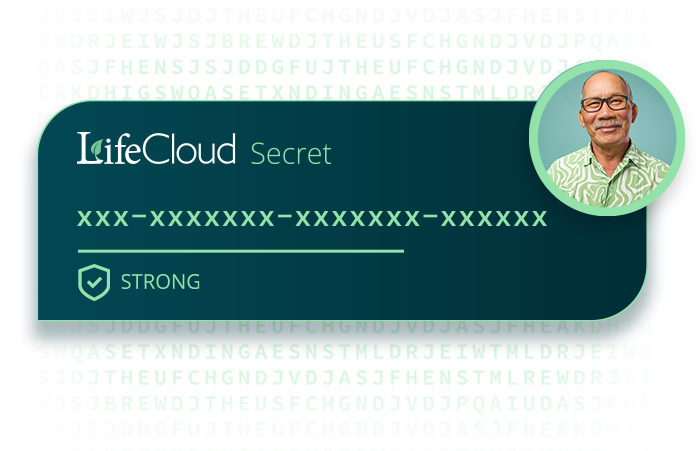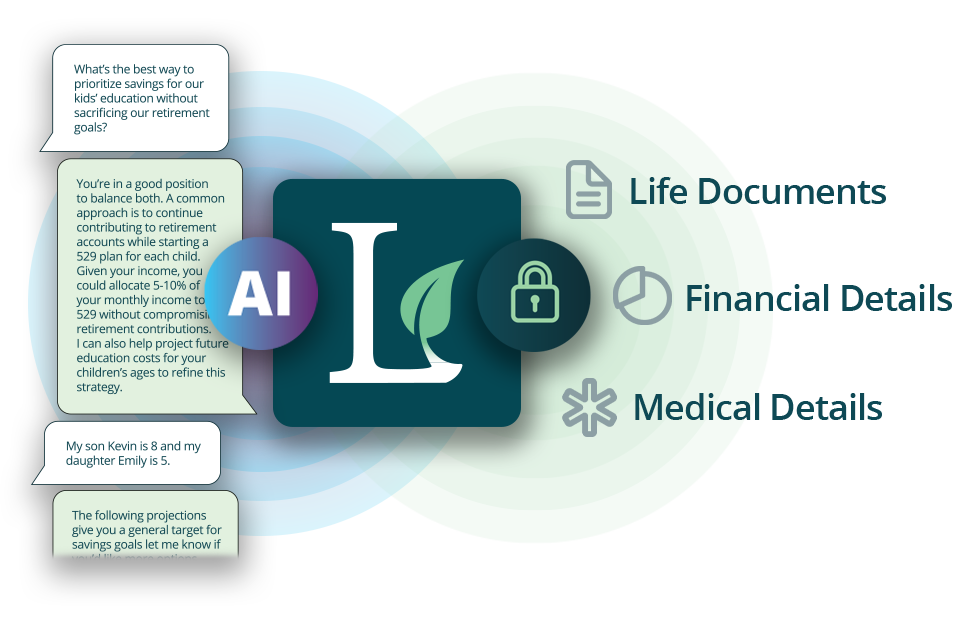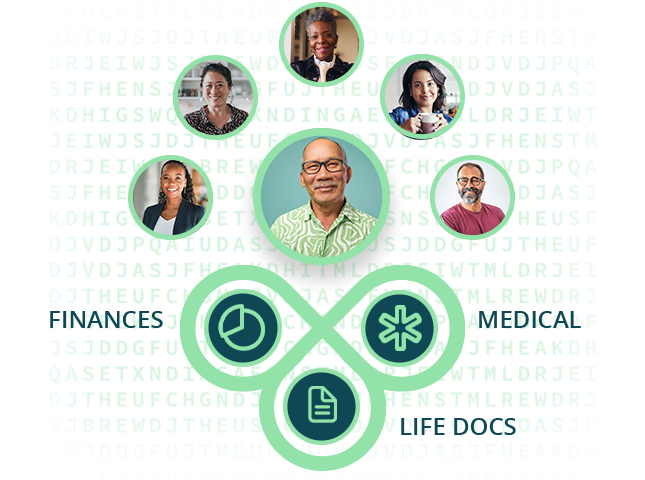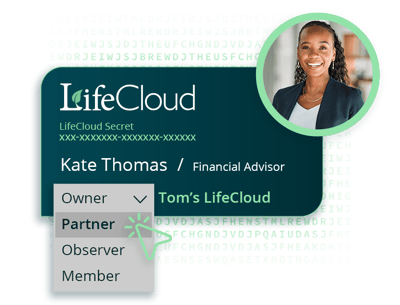Uncompromised Data Security
In today’s world of constant data breaches, LifeCloud stands apart with a zero-trust architecture designed to secure your most sensitive information. At LifeCloud, trust is never assumed—every layer of our platform is built to ensure that only you have access to your data.

Uncompromised
Data Security
In today’s world of constant data breaches, LifeCloud stands apart, built on a zero-trust architecture designed specifically for the long term security of your most sensitive information.
At LifeCloud, trust is never assumed—every layer of our platform is built to ensure that only you have access to your data.

Protected For Life
Your LifeCloud Secret protects your most important data. This unique passphrase, created and remembered only by you, is the key to accessing the encrypted contents of your LifeCloud.
Because it’s never stored on our systems, not even LifeCloud employees can access your information. This straightforward protection ensures that your data remains private, secure, and completely under your control.
Your LifeCloud is fully protected by your LifeCloud Secret, ensuring that only you and those you trust can access your data.

Protected For Life

Your LifeCloud Secret protects your most important data. This unique passphrase, created and remembered only by you, is the key to accessing the encrypted contents of your LifeCloud.
Because it’s never stored on our systems, not even LifeCloud employees can access your information. This straightforward protection ensures that your data remains private, secure, and completely under your control.
Your LifeCloud is fully protected by your LifeCloud Secret, ensuring that only you and those you trust can access your data.
Secure AI Insights
All interactions with LifeCloud’s AI Assistant are protected by your LifeCloud Secret and securely encrypted within your LifeCloud.
By uploading key details—finances, healthcare, or legal matters—you unlock the power of personalized AI insights while keeping your information secure and ready to share when needed.

Secure AI Insights

All interactions with LifeCloud’s AI Assistant are protected by your LifeCloud Secret and securely encrypted within your LifeCloud.
By uploading key details—finances, healthcare, or legal matters—you unlock the power of personalized AI insights while keeping your information secure and ready to share when needed.
Secure Sharing

You never know when you’ll need to share your important life details. With LifeCloud, you can rest assured that your information is organized and ready to be securely shared on your terms.
Invite trusted family, friends, and advisors to your LifeCloud Circle, and use LifeCloud as your secure and reliable sharing platform.
All members of your circle create their own LifeCloud Secret. One LifeCloud secret opens all LifeClouds to which you have been given access.
Secure Sharing
You never know when you’ll need to share your important life details. With LifeCloud, you can rest assured that your information is organized and ready to be securely shared on your terms.
Invite trusted family, friends, and advisors to your LifeCloud Circle, and use LifeCloud as your secure and reliable sharing platform.
All members of your circle create their own LifeCloud Secret. One LifeCloud secret opens all LifeClouds to which you have been given access.

Assigning Access Levels
You can assign each circle member a specific access level tailored to the role they’ll play in developing and maintaining your LifeCloud. Whether they’re a trusted advisor, a family member, or a key decision-maker, you control what they can view or manage, ensuring your LifeCloud stays secure and organized according to your needs.
Owner
A LifeCloud account can have multiple owners. Owners can access and edit everything, delete the account, and modify Circle memberships.
Partner
A partner can access and edit everything in the LifeCloud but does not have the ability to modify Circle memberships or delete the LifeCloud account.
Observer
An observer member can view all of the documents but cannot add or edit any documents.
Member
A member can’t see anything in the LifeCloud. They are individuals who are not ready to have access to your LifeCloud yet but may one day.
Owner
A LifeCloud account can have multiple owners. Owners can access and edit everything, delete the account, and modify Circle memberships.
Observer
An observer member can view all of the documents but cannot add or edit any documents.
 Partner
Partner
A partner can access and edit everything in the LifeCloud but does not have the ability to modify Circle memberships or delete the LifeCloud account.
 Member
Member
A member can’t see anything in the LifeCloud. They are individuals who are not ready to have access to your LifeCloud yet but may one day.
Trust LifeCloud
We don’t take chances with your data. Protecting our users’ data is our top priority—that’s our promise to you. The LifeCloud platform adopts a zero-trust approach to data security, encrypting your data uniquely ensuring only you have access.

SOC-2 Type 2 Certification
The LifeCloud platform undergoes rigorous SOC 2 Type 2 certification underscores a company's ongoing commitment to robust data security, assessing its controls over time against the AICPA's Trust Services Criteria. This audit evaluates the effectiveness of security measures across a defined period, providing stakeholders with assurance about the company's continuous protection of sensitive information.
Service audits are performed by the American Institute of Certified Public Accountants ("AICPA")
SOC-3 Compliance
SOC 3 certification is a public assurance that an organization meets rigorous data security standards. It evaluates the security, availability, and confidentiality of information systems and demonstrates compliance with the Trust Services Criteria set by the AICPA. Achieving SOC 3 certification signals a strong commitment to data protection, reinforcing trust and reliability in handling sensitive information.
Service audits are performed by the American Institute of Certified Public Accountants ("AICPA")

HIPPA Compliant
Being HIPAA certified demonstrates a company’s adherence to the stringent privacy and security standards set by the Health Insurance Portability and Accountability Act. This certification focuses on ensuring that customer information is protected, managing how it is used and disclosed. Achieving HIPAA certification confirms that an organization implements robust safeguards, both physical and electronic, to protect customer data, fostering trust among service providers and customers by ensuring compliance with federal regulations for data privacy.
Data Protection Measures
Encryption of Data at Rest
We do more than just AES-256 encryption; we've introduced the "LifeCloud Secret." It's a unique encryption key known only to you. With LifeCloud, you are the only key holder, ensuring that neither our team nor any third parties can access your encrypted data.
Encryption of Data in Transit
We exclusively support TLS 1.3, the latest and most secure encryption protocol for data in transit. LifeCloud ensures the utmost security while your data is moving between systems.
Zero-trust
LifeCloud is built with a zero-trust security model. By default, no one is trusted from inside or outside the system, requiring verification from everyone trying to access LifeCloud. We firmly believe this level of security is not just important, but necessary to protect your most important details.
Multi-factor Authentication
LifeCloud implements robust multi-factor authentication (MFA) to enhance platform security and protect user accounts. When logging in, users are required to provide not only their password but also a secondary form of authentication, such as a unique code sent to their registered email. This additional layer of security significantly reduces the risk of unauthorized access, ensuring that only authorized users can gain entry to their LifeCloud accounts. By leveraging MFA, LifeCloud provides peace of mind to users, knowing that their sensitive data is safeguarded against potential threats.
Operational Procedures
LifeCloud is dedicated to following security best practices (regular security checks, software updates, and monitoring to ensure everything is secure). The LifeCloud system also undergoes audits from independent third-party organizations. These audits ensure we adhere to rigorous standards like SOC2, SOC3, and HIPAA. We believe in transparency, so we share our audit findings with our users.
Access Control
By design, our employees cannot access your vital estate information. This is because all of your data is protected by your LifeCloud Secret; since we don't store your Secret on our system, our employees cannot access your data. This does come with a trade-off in that we can’t answer specific questions about the data that you may have, but this is the trade-off in favor of the very high security of your data.
Trust LifeCloud
We don’t take chances with your data. Protecting our users’ data is our top priority—that’s our promise to you. The LifeCloud platform adopts a zero-trust approach to data security, encrypting your data uniquely ensuring only you have access.
SOC-2 Type 2 Certification
The LifeCloud platform undergoes rigorous SOC 2 Type 2 certification, underscoring a company's ongoing commitment to robust data security and assessing its controls over time against the AICPA's Trust Services Criteria. This audit evaluates the effectiveness of security measures across a defined period, providing stakeholders with assurance about the company's continuous protection of sensitive information.
Service audits are performed by the American Institute of Certified Public Accountants ("AICPA")
SOC-3 Compliance
SOC 3 certification is a public assurance that an organization meets rigorous data security standards. It evaluates the security, availability, and confidentiality of information systems and demonstrates compliance with the Trust Services Criteria set by the AICPA. Achieving SOC 3 certification signals a strong commitment to data protection, reinforcing trust and reliability in handling sensitive information.

HIPAA Compliant
Data Protection Measures
Encryption of Data at Rest:
We do more than just AES-256 encryption; we've introduced the "LifeCloud Secret." It's a unique encryption key known only to you. With LifeCloud, you are the only key holder, ensuring that neither our team nor any third parties can access your encrypted data.
Encryption of Data in Transit:
We exclusively support TLS 1.3, the latest and most secure encryption protocol for data in transit. LifeCloud ensures the utmost security while your data is moving between systems.
Zero-trust:
LifeCloud is built with a zero-trust security model. By default, no one is trusted from inside or outside the system, requiring verification from everyone trying to access LifeCloud. We firmly believe this level of security is not just important, but necessary to protect your most important details.
Multi-factor Authentication:
LifeCloud implements robust multi-factor authentication (MFA) to enhance platform security and protect user accounts. When logging in, users are required to provide not only their password but also a secondary form of authentication, such as a unique code sent to their registered email. This additional layer of security significantly reduces the risk of unauthorized access, ensuring that only authorized users can gain entry to their LifeCloud accounts. By leveraging MFA, LifeCloud provides peace of mind to users, knowing that their sensitive data is safeguarded against potential threats.
Operational Procedures:
LifeCloud is dedicated to following security best practices (regular security checks, software updates, and monitoring to ensure everything is secure). The LifeCloud system also undergoes audits from independent third-party organizations. These audits ensure we adhere to rigorous standards like SOC2, SOC3, and HIPAA. We believe in transparency, so we share our audit findings with our users.
Access Control:
By design, our employees cannot access your vital estate information. This is because all of your data is protected by your LifeCloud Secret; since we don't store your Secret on our system, our employees cannot access your data. This does come with a trade-off in that we can’t answer specific questions about the data that you may have, but this is the trade-off in favor of the very high security of your data.
Frequently Asked Questions
How does LifeCloud prevent unauthorized access?
You have to authenticate (login with a username and password) and a two-factor authentication which requires a time-based code in addition to your username and password. This authentication process happens over HTTPS - a secure, encrypted Web channel. All of this is standard industry authentication.
In addition, you need a LifeCloud Secret to unlock your LifeCloud data. The secret is a passphrase that you can remember and long enough that it can’t be guessed. A simple example might be, “my favorite movie of all-time is top gun.” Case and spaces do not have to be remembered - we strip it down to help remember the secret a little easier. This extra level of security makes LifeCloud completely secure since we don’t save your secret anywhere on the system.
Does LifeCloud perform regular security audits?
Yes, LifeCloud is subject to frequent security evaluations by an independent CPA firm accredited by the AICPA. These evaluations encompass annual SOC 2 and HIPAA audits. Furthermore, a SOC 3 report, summarizing the findings of the SOC 2 audit, is made available. These rigorous audits confirm that LifeCloud meets and surpasses industry benchmarks for safeguarding data. Moreover, LifeCloud employs a better-than-bank encryption architecture, enhancing the security of your data beyond these established standards.
What happens if I forget my personal LifeCloud Secret?
You must specify a hint to help you remember your secret. Sometimes all you need is a little reminder word or two to jog your memory. But if you absolutely forget your secret then all you need to do is pick a new secret and then have someone in your LifeCloud circle re-invite you back into your own LifeCloud.
Can you explain LifeCloud’s data retention policies?
LifeCloud will save your data for a lifetime as long as you maintain your subscription. If you cancel your subscription or forget to renew, LifeCloud will send you notifications and we provide a 30 day grace period for you to re-establish your subscription.
Will LifeCloud sell my data?
No, LifeCloud is committed to securing and protecting your data. We prioritize your privacy and have implemented robust measures to ensure your information remains confidential and secure. At LifeCloud, we believe that trust is the foundation of our relationship with you, and selling your data would violate that trust. Rest assured, we do not and will not sell your data to any third parties.
What happens to my LifeCloud data if I cancel my membership to LifeCloud?
If you cancel your subscription to LifeCloud, your account will be deactivated, which disables your access to services that require a LifeCloud account. Your personal and estate data stored with LifeCloud will not be immediately deleted but will remain in a deactivated state for at least 30 days. This period allows for data retrieval or account reactivation if you change your decision. After this time, LifeCloud reserves the right to delete or purge your data permanently unless required by law to retain it longer, in which case access to such data will be blocked. If you need to access, correct, update, or delete your personal information during this period, you can contact LifeCloud support, who will respond within the legally specified timeframe or without unnecessary delay.
What happens to my LifeCloud data if my account lapses?
If your LifeCloud account lapses, the data associated with it will initially be retained and not immediately deleted. This retention allows for a period during which you could potentially reactivate your account. The data remains in a deactivated state for at least 30 days, during which you can access, correct, update, or request the deletion of your personal information. After this period, LifeCloud reserves the right to delete or purge the data unless retention is required by law. In such cases where law requires data to be retained, access to this data will be blocked.
If you decide to cancel or do not reactivate your lapsed account within the stipulated time, and there are no legal impediments, your data will be permanently removed from LifeCloud's servers, following the completion of the retention period. This process ensures your personal information is handled respectfully and in line with privacy commitments, even if you choose to discontinue using LifeCloud's services.
Can LifeCloud employees see the content of my LifeCloud?
No, LifeCloud is designed to ensure that only the owner of the LifeCloud account and those whom the owner chooses to share their LifeCloud with can access their data.
Where can I report issues with the product?
If you encounter issues with a LifeCloud product, you can report these issues by contacting LifeCloud support team via this link.




